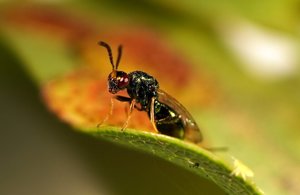Global S&T Development Trend Analysis Platform of Resources and Environment
| Greater protection for sweet chestnut trees in England | |
| admin | |
| 2021-04-26 | |
| 发布年 | 2021 |
| 语种 | 英语 |
| 国家 | 英国 |
| 领域 | 气候变化 ; 资源环境 |
| 正文(英文) |
News story
Approval given for the release of a biological control agent to reduce the spread of Oriental Chestnut Gall Wasp. 
Credit: Dr Chris Malumphy, Fera Science Ltd. Scientists are stepping up the fight against an invasive tree pest of sweet chestnut trees - Oriental Chestnut Gall Wasp - the UK’s Chief Plant Health Officer announced today. Approval has been given for the release of a parasitoid wasp called Torymus sinensis, a natural biological control agent, to help reduce the spread of Oriental Chestnut Gall Wasp in England to protect the health of sweet chestnut trees. This method of natural pest control works by using Torymus sinensis to kill the Oriental Chestnut Gall Wasp, thereby controlling the pest in England. Oriental Chestnut Gall Wasp was first found in England in 2015. The wasp causes galls on the buds and leaves of sweet chestnut which damage the tree. In high numbers, the gall wasp can weaken sweet chestnut trees and make them more vulnerable to other pests and diseases, including Sweet Chestnut Blight. Torymus sinensis is already present naturally in England but in very low numbers. Further releases of the parasitoid will enable the population to build up to a level to effectively control Oriental Chestnut Gall Wasp. This method of biological control is used successfully in many countries across Europe. Chief Plant Health Officer Nicola Spence said:
Today’s announcement follows extensive research commissioned by the Department for the Environment Food and Rural Affairs in partnership with Fera Science Ltd, a thorough risk assessment and careful testing to ensure the safe, controlled release of the parasitoid in the UK. The release of any biological control agent is carefully regulated, and the release gained governmental approval after robust scientific review, including by the Advisory Committee on Releases to the Environment and a public consultation. Fera Science Ltd will sensitively control the release, with a programme of monitoring for the next 10 years. Senior Scientist at Fera Science Ltd Neil Audsley said:
The release of Torymus sinensis is part of the government’s long-term strategic response to managing threats from tree pest and diseases to achieve the goals of the Tree Health Resilience Strategy (2018). Working in partnership with world leading scientists and colleagues from the Forestry Commission and the Animal and Plant Health Agency, Defra will continue to protect England’s sweet chestnut trees from existing and emerging threats. Scientists at Forest Research are currently conducting further research on pest and diseases of sweet chestnut trees, including research on Oriental Chestnut Gall Wasp and Sweet Chestnut Blight.
Published 26 April 2021
|
| URL | 查看原文 |
| 来源平台 | Department for Environment, Food and Rural Affairs |
| 文献类型 | 新闻 |
| 条目标识符 | http://119.78.100.173/C666/handle/2XK7JSWQ/323655 |
| 专题 | 气候变化 资源环境科学 |
| 推荐引用方式 GB/T 7714 | admin. Greater protection for sweet chestnut trees in England. 2021. |
| 条目包含的文件 | 条目无相关文件。 | |||||
| 个性服务 |
| 推荐该条目 |
| 保存到收藏夹 |
| 查看访问统计 |
| 导出为Endnote文件 |
| 谷歌学术 |
| 谷歌学术中相似的文章 |
| [admin]的文章 |
| 百度学术 |
| 百度学术中相似的文章 |
| [admin]的文章 |
| 必应学术 |
| 必应学术中相似的文章 |
| [admin]的文章 |
| 相关权益政策 |
| 暂无数据 |
| 收藏/分享 |
除非特别说明,本系统中所有内容都受版权保护,并保留所有权利。
修改评论